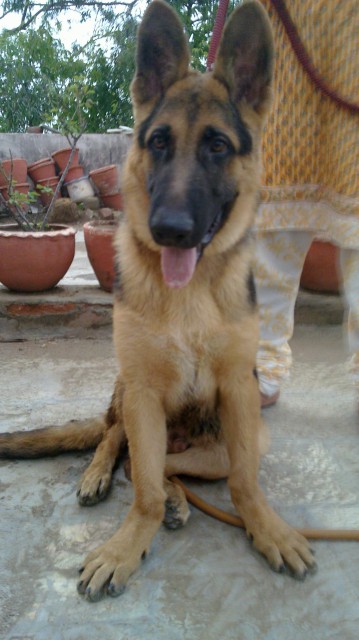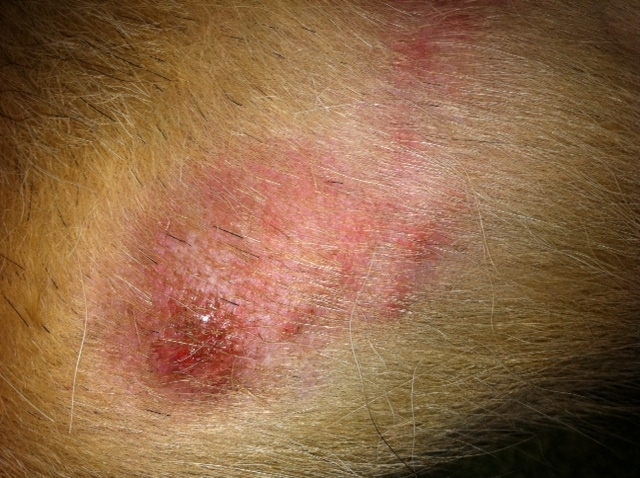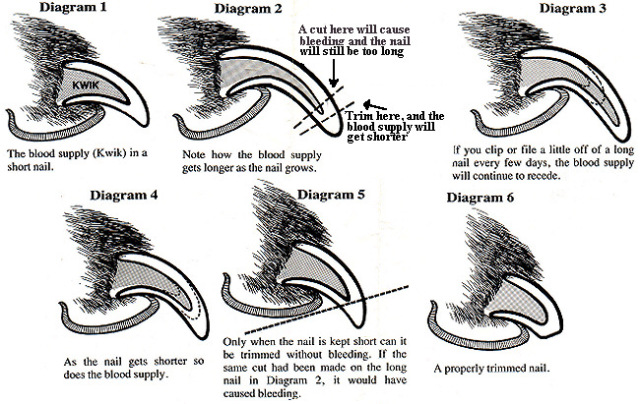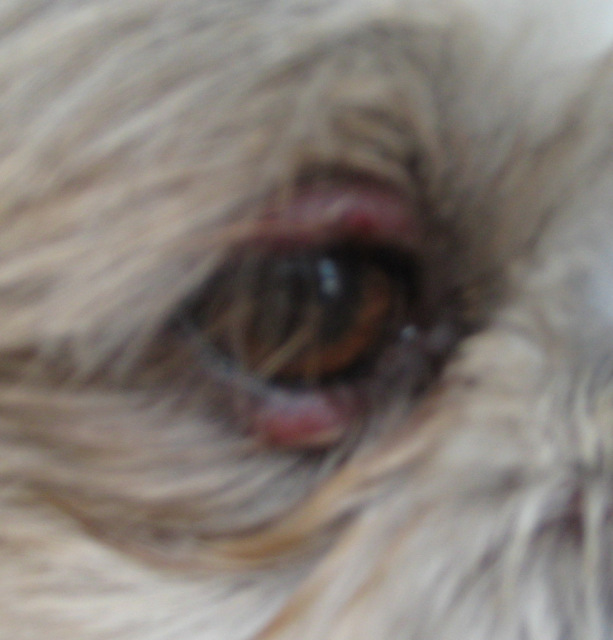Question
 bent pasterns
bent pasterns
hi...i have a 7 month old german shepherd and his pasterns seem to be extremely bent and week.im giving him dog food having around 27 percent protien and adittional calcium suppliments. i m a bit worried bout it.. pls suggest me some treatment or the precautions i should take to prevent them from getting worse...
AnswerOK first of all, stop ALL calcium supplements right now. All you are doing by giving those is creating a dog with a sure chance of getting hip dysplasia. You never, ever add calcium to a large breed dog's food. That creates an imbalance of the calcium/phosphorus ratio which is known to be the leading cause of hip problems.
This dog should have been seen by a vet months ago for this pastern problem. At 7 months old he should be past this.
What is your vet doing for him?
By and large the best treatment recommended for these dogs is to put them on a large breed puppy food such as Science Diet Large Breed Puppy Growth and see if they don't resolve this on their own. It is a wait and see issue basically. Unfortunately, in some dogs it doesn't resolve completely. You need to let the breeder know where you bought this dog since this is an inheritable weakness.
Don't treat with calcium but get the Large Breed Puppy Food. I know they sell Science Diet over there as I have had other people get it there. It can also be ordered online.
This article is from a vet who answered a question much like yours:
"Weak pasterns in German Shepherd pup
Question: Dear Dr Richards - My 6 month old German shepherd male, Tashi, has weak pasterns. These are moderate in degree, not extyensive; he does not walk on his ankles, nor is he "hare-footed" - yet. I can send a photo by e-mail if that would help.
I've been told by the breeder and by one veterinarian that this is not a significant problem, and that it will self-correct some time within the first two years of life.
Tashi is slender, and we keep him that way. His frame is a bit large for his age, and at 6 months' age he weighs 58 lbs. His food is 1.5 cups of Diamond premium adult dog food twice daily. Usually, but not always, he eats it all. His only dietary supplement is about 1.5 tablespoon of vanilla yogurt with his food twice daily.
Tashi comes from American show lines, but he will not be a show dog. He is currently in the early stages of getting his CGC and (I hope and expect) on his way toward a CD. He will also do some "no impact" agility, just for his fun.
He also has a clinical diagnosis of panosteitis, only because of migratory soreness in one front leg or the other. There has been no long bone tenderness or joint tenderness, and radiographs have not been done of either the long bones or the pasterns.
I know that this problem is seen in most large breeds of dogs, and that German shepherds are particularly prone (no pun intended) to it. However, the only other gsd's I've had close acquaintance with have not had the problem.
Questions (1) can you tell me just how likely it is that the problem will resolve - certain, very likely, 50-50, or unlikely? (2) are there any supplements or other treatments which are **proven** to be of help? (3) how much exercise is permissible with this problem? We've been told to be sure he gets plenty of exercise, that he should never run, that he must never jump, and that it doesn't make much difference. (from the practical point of view, it's virtually impossible to keep him from running unless I confine him to the house and never let him outside unless he's leashed. Otherwise, he gets plenty of walking exercise, and enough running around with his "little sister" who is a golden retriever.) (4) perhaps as much for the panosteitis as for the pasterns - is there any harm in giving him an occasional Bufferin or carprofen (Rimadyl) on days when he's especially sore, assuming I don't let him increase his exercise just because pain is masked my the med?
It would be very helpful to me if you can reply to the e-mail address above, though I will be sure to check the Vetinfo web site as well.
Thanks for your help - Bill
Answer: Bill-
I have tried to find information for you but there isn't a lot of it in my textbooks and in speaking with other veterinarians about this in the past, the suggestions have tended to run towards what you are doing.
Prior to the introduction of the large breed puppy foods, the recommendations tended to run towards using an adult dog food. There is sometimes a problem with increased intake of calcium taking this approach, though. So currently, the recommendations seem to be running towards using one of the large breed puppy foods. There are several on the market, so I think you'd be able to find one. In addition, it is a good idea to keep the puppy from becoming obese, which doesn't sound like it is a problem.
The second common piece of advice is to encourage moderate exercise consistently, in the hope that increased muscle strength will decrease the laxity in the tendon and muscle structure.
I can't say what percentage of German shepherds outgrow this condition but in our practice I think it is near 50%. Almost all improve some, but many continue to walk with the hocks down, or the carpus down, depending on which is affected, into their adult lives. If this is really severe arthrodesis of the hock might offer some relief but I can't recall ever having a patient in which that seemed absolutely necessary.
There is a condition in German shepherd dogs in which draining tracts develop around the hocks, that is thought to be due to an immunologic problem in which there is a reaction to the collagen around the joint (I am not sure why just this joint, though). This seems to occur in young adult GSDs and some of the clinical case reports also mention a history of postural problems with the hocks. This disorder is referred to as focal metatarsal fistulation of the German shepherd dog in "Small Animal Dermatology" by Scott, et. al.
At the present time, some vets seem to think that supplementation with antioxidants or essential fatty acids may be helpful (note the uncertainty). It is pretty safe to supplement with DermCaps (tm), 3V Capsules (tm), OmegaDerm (tm) or something similar and to add Vitamin E (usually around 400 to 1000 IU daily) as an antioxidant. There are no supplements, no dietary changes and no exercise programs that I am aware of that have been documented to make a difference in this condition.
If he continues to have soreness from the panosteitis I definitely think it is OK, and advisable, to use pain relievers. Carprofen (Rimadyl Rx) is a good pain reliever, as is etodolac (Etogesic Rx) and I like aspirin, as well. Some dogs have really severe pain from this condition and I think it is OK to use opioid medications, such as codeine or even morphine, if the pain is severe enough.
I wish that I did have a way to help with his pastern laxity problem that I knew was effective."
That is from this web site:http://www.vetinfo.com/dleg.html
I would definitely have the vet look this dog over, but get the food and give him some time. He may yet come back up on his legs. Follow the advice of this vet per exercising as well.
Good luck. He is a beautiful dog and I know he will do well.


 1front/1hind leg poralisis ina dog
QuestionQUESTION: Hello,
I have a 9 year old Hairless C
1front/1hind leg poralisis ina dog
QuestionQUESTION: Hello,
I have a 9 year old Hairless C
 German Shepard Skin Problem
Question
Max
Hi, My 6 year old male German Shepa
German Shepard Skin Problem
Question
Max
Hi, My 6 year old male German Shepa
 Bloody Hair Ball
Question
My Little Girl
My indoor cat vomited up a very
Bloody Hair Ball
Question
My Little Girl
My indoor cat vomited up a very
 Dog Toenails
QuestionIs it possible for a dogs toenails to get so lo
Dog Toenails
QuestionIs it possible for a dogs toenails to get so lo
 Shih-Tzu eyelide problem
Question
swollen eyelids
Hi,
Its been about 2 weeks no
Shih-Tzu eyelide problem
Question
swollen eyelids
Hi,
Its been about 2 weeks no